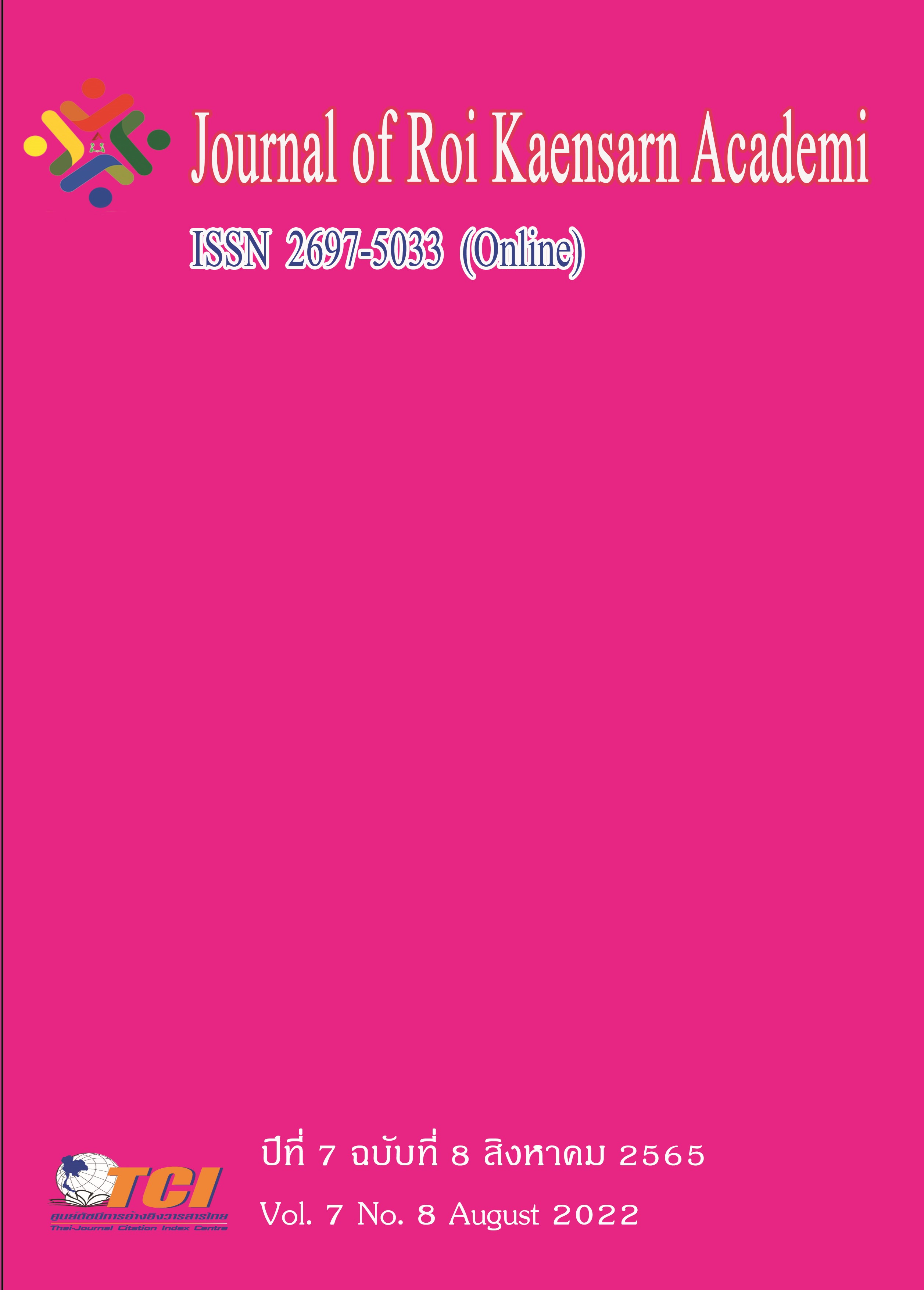การศึกษาความสามารถในการสร้างสรรค์ตามศาสตร์พระราชา ของนักเรียนชั้นมัธยมศึกษาปีที่ 4 โดยใช้การจัดการเรียนรู้โครงงานเป็นฐาน (Project - based learning) ร่วมกับแนวคิดผลิตภาพ
Main Article Content
บทคัดย่อ
การวิจัยครั้งนี้มีวัตถุประสงค์เพื่อ 1) เปรียบเทียบผลการเรียนรู้ เรื่อง ศาสตร์พระราชา ของนักเรียนชั้นมัธยมศึกษาปีที่ 4 โดยใช้การจัดการเรียนรู้โครงงานเป็นฐานร่วมกับแนวคิดผลิตภาพ 2) ศึกษาความสามารถในการสร้างสรรค์ตามศาสตร์พระราชา ของนักเรียนชั้นมัธยมศึกษาปีที่ 4 โดยใช้การจัดการเรียนรู้โครงงานเป็นฐานร่วมกับแนวคิดผลิตภาพ และ 3) ศึกษาความพึงพอใจของนักเรียนชั้นมัธยมศึกษาปีที่ 4 ที่มีต่อการจัดการเรียนรู้โครงงานเป็นฐานร่วมกับแนวคิดผลิตภาพ กลุ่มตัวอย่างที่ใช้ในการวิจัยคือ นักเรียนชั้นมัธยมศึกษาปีที่ 4/10 ภาคเรียนที่ 1 ปีการศึกษา 2564 โรงเรียนสตรีสมุทรปราการ จำนวน 37 คน เครื่องมือที่ใช้ในการวิจัย ประกอบด้วย 1) แผนการจัดการเรียนรู้ เรื่อง ศาสตร์พระราชา 2) แบบทดสอบวัดความสามารถในการสร้างสรรค์ตามศาสตร์พระราชา 3) แบบทดสอบวัดผลการเรียนรู้ เรื่อง ศาสตร์พระราชา และ 4) แบบสอบถามความพึงพอใจของนักเรียนชั้นมัธยมศึกษาปีที่ 4 ที่มีต่อการจัดการเรียนรู้แบบโครงงานเป็นฐานร่วมกับแนวคิดผลิตภาพ สถิติที่ใช้ในการวิเคราะห์ข้อมูล ได้แก่ ค่าเฉลี่ย ส่วนเบี่ยงเบนมาตรฐาน การทดสอบค่าทีแบบไม่เป็นอิสระต่อกัน และการวิเคราะห์เนื้อหา ผลการวิจัยพบว่า 1) ผลการเรียนรู้หลังเรียนโดยใช้การจัดการเรียนรู้โครงงานเป็นฐานร่วมกับแนวคิดผลิตภาพสูงกว่าก่อนเรียนอย่างมีนัยสำคัญทางสถิติที่ระดับ .05 2) ความสามารถในการสร้างสรรค์ศาสตร์พระราชาของนักเรียนชั้นมัธยมศึกษาปีที่ 4 โดยใช้การจัดการเรียนรู้โครงงานเป็นฐานร่วมกับแนวคิดผลิตภาพ ทั้ง 4 ด้าน มีพัฒนาการสูงขึ้นตามลำดับ 3) ความพึงพอใจของนักเรียนชั้นมัธยมศึกษาปีที่ 4 ที่มีต่อการจัดการเรียนรู้โครงงานเป็นฐานร่วมกับแนวคิดผลิตภาพ โดยภาพรวมอยู่ในระดับมาก
Article Details
เอกสารอ้างอิง
ณัฐริกา ก้อนเงิน. (2558). การศึกษาการเรียนรู้แบบโครงงานเป็นฐานโดยใช้เครื่องมือการเรียนรู้ร่วมกับออนไลน์ด้วยเทคนิคดอกบัวบาน ที่มีต่อความคิดสร้างสรรค์สำหรับนักเรียนระดับมัธยมศึกษาตอนปลาย. วิทยานิพนธ์ปริญญาครุศาสตรมหาบัณฑิต. บัณฑิตวิทยาลัย: จุฬาลงกรณ์มหาวิทยาลัย.
ดวงพร อิ่มแสงจันทร์. (2554). การพัฒนาผลการเรียนรู้ เรื่อง หลักปรัชญาเศรษฐกิจพอเพียงกับการพัฒนาเศรษฐกิจของประเทศและความสามารถในการแก้ปัญหาตามขั้นตอนการจัดการเรียนรู้แบบโครงงานของนักเรียนชั้นมัธยมศึกษาปีที่ 5. วิทยานิพนธ์ปริญญามหาบัณฑิต สาขาวิชาการสอนสังคมศึกษา บัณฑิตวิทยาลัย: มหาวิทยาลัยศิลปากร.
ทิศนา แขมมณี. (2548). ศาสตร์การสอน องค์ความรู้เพื่อการจัดกระบวนการเรียนรู้ที่มีประสิทธิภาพ. (พิมพ์ครั้งที่ 4). สำนักพิมพ์แห่งจุฬาลงกรณ์มหาวิทยาลัย.
ไพฑูรย์ สินลารัตน์. (2559). ปรัชญาการศึกษาเชิงสร้างสรรค์และผลิตภาพ. กรุงเทพมหานคร: โรงพิมพ์แห่งจุฬาลงกรณ์มหาวิทยาลัย.
วัชรา เล่าเรียนดี. (2548). เทคนิคการเรียนการสอนและการนิเทศ. (พิมพ์ครั้งที่ 4). โรงพิมพ์แห่งมหาวิทยาลัยศิลปากร.
สมบัติ นพรัก. (2561). ศาสตร์พระราชา สู่การพัฒนาศาสตร์การบริหาร. กรุงเทพมหานคร: อมรินทร์ พริ้นติ้งแอนด์พับลิซซิ่ง.
สุชาติ วงศ์สุวรรณ. (2542). การเรียนรู้สำหรับศตวรรษที่ 21 การเรียนรู้ที่เน้นผู้เรียนเป็นผู้สร้างความรู้ด้วยตนเอง โครงงาน. กรุงเทพมหานคร: โรงพิมพ์คุรุสภา ลาดพร้าว.
Guillford,J.P. (1959). Personnality. New York: Mcgrn Hill Book Company.
Kay, K. (2010). 21st Century Skills: Why the Matter, What They are, and How We GetThere. In Bellanca, J. & Brandt, R. (Eds.), 21st Century Skills: Rethinking How Students Learn. Bloomington, In: Solution Tree Press.
Martin, J. (2010). The Meaning of the 21st Century. Bangkok. L. T. P. The Partnership
for 21st Century Skill. (2009). Framework for 21st Century Learning. Online. Retrieved June 5, 2015, from http://21st Century skill. Org/index.php.
Piaget, J. (1970). Science of Education and the Psychology of the Child. New York : Orion Press.

